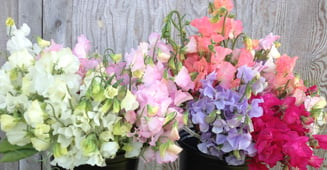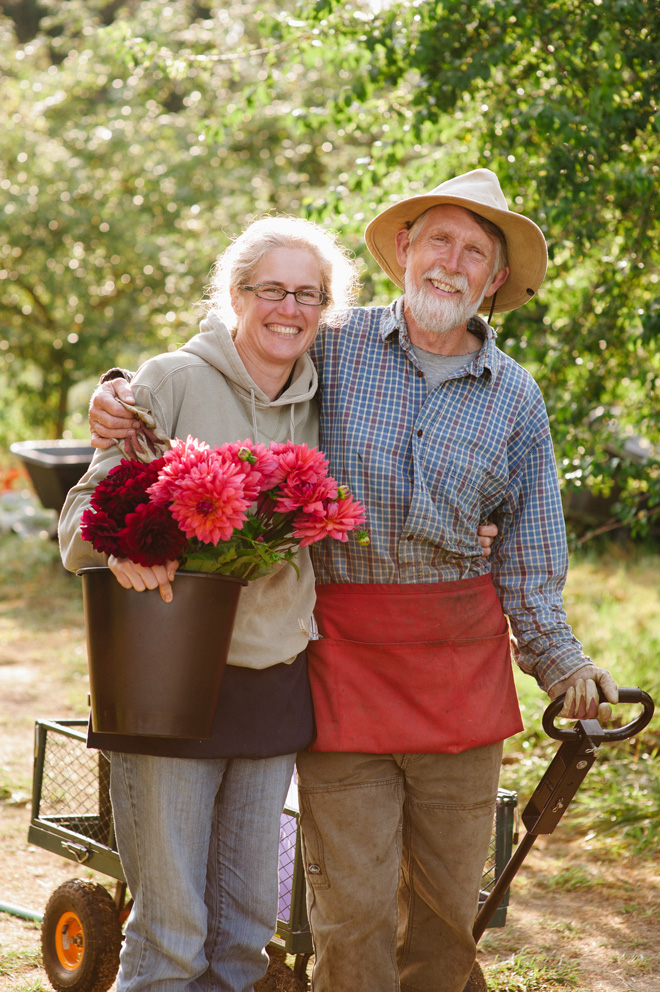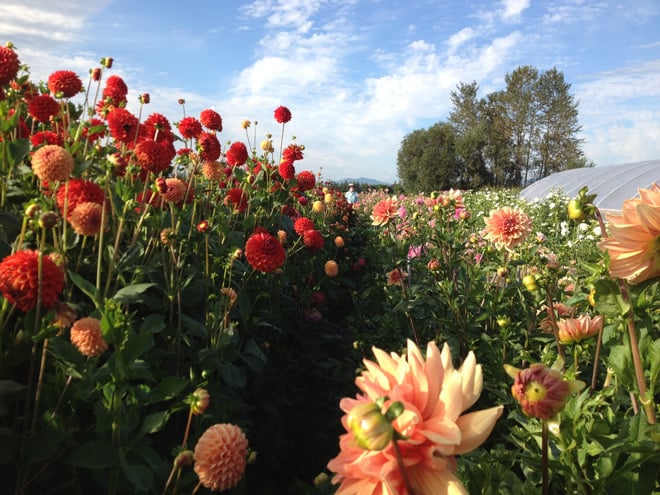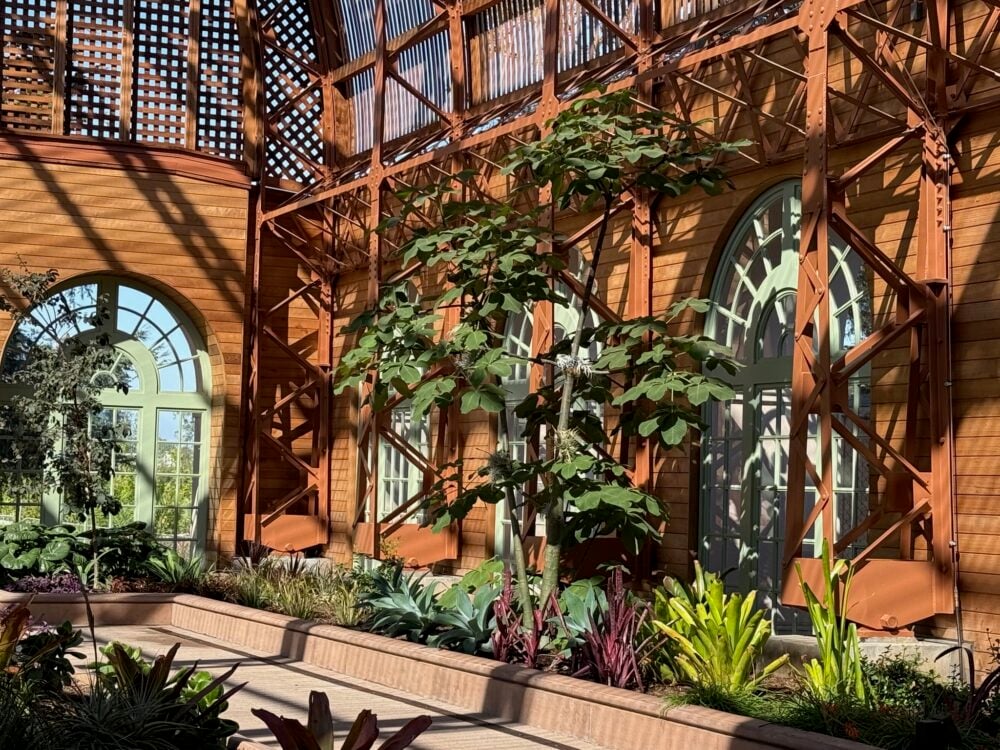

Contributor
- Topics: Archive

Artists, a performer, and now eco-friendly flower farmers and advocates for others in their field, Diane Szukovathy and Dennis Westphall of Jello Mold Farm have a knack for fostering connections.
A conversation between editor Lorene Edwards Forkner and Diane Szukovathy who together with Dennis Westphall, owns and operates Jello Mold Farm.
LEF: How do two artists end up in the Skagit Valley growing flowers?

DS: Dennis and I met in the mid-nineties. He was a singer/songwriter and I was a painter and studio artist who accidentally achieved 15 minutes of fame by covering a building in Seattle with 500 jello molds during the early nineties. Next to the building was a fertile, southern exposure parking strip where I discovered a nearly debilitating interest in all things botanical and planted an eclectic little garden. From there, I decided to meld my passion with a paying profession and started a landscaping business called Jello Mold Landscape.
Creativity and a shared interest in the natural world led Dennis and I to innocently purchasing seven acres of farmland in 2001. We had no idea what we were doing, except we were exhilarated by the prospects of gardening in rock-free soil and living outside the city. Inspired by a Wendell Berry essay on agronomy and ecology, we decided to try to make a living from the land, rather than commuting to city jobs. Flower farming was a natural fit because, like most artists, we were already comfortable in the role of being slaves to beauty.
LEF: Your website states your adherence to sustainable practices. What does that look like at Jello Mold Farm?
DS: The core of our farming philosophy goes like this, “when in doubt, add more life.” We start by choosing crops that are suitable for our climate and that do well on our piece of ground. And we are careful about all of our inputs. We only use OMRI-certified fertilizers and insecticides, and our farm is certified Salmon-Safe. We looked into organic certification but the process is geared toward food production; it would be costly and cumbersome to warrant the investment for floral crops. We prefer Salmon-Safe’s regional emphasis on following farming practices that preserve the health of our local waterways.
Each year we refine our systems and efficiencies come easier. The farm continually hosts a mixed bag of greater diversity—from birds and beneficial insects, to horsetail and botrytis. We have to stay alert and adaptive, and also maintain a generous attitude toward loss.

LEF: Cure us of our romantic notions of being a flower farmer.
DS: Ask me again in September when we’ve gone four months without a day off, but today I’ll say we are still as big of romantic fools as the day we started this crazy endeavor. I can’t explain it, but I’m pretty sure it’s because—rather than in spite of—all of the challenges. And please don’t mistake this for sugar coating. Think clouds of mosquitoes, picking slugs until they become an island in a pint of beer, way too much bookwork, city states of voles that are pre-programed to skip over weeds and eat the crops, equipment issues, sleep deprivation, rabbits snacking on the drip irrigation lines, a summer housekeeping regime that involves opening the windows so you can’t smell the dust, and working day and night, you get the idea…
Ask any small-scale farmer—economic globalization makes being producers in our part of the world challenging. To start a flower farm and sustain a modest lifestyle from that farm requires equal parts moxie, business savvy, creativity, and blind hope. As with most businesses, labor (including our own) is our biggest expense. Eighty percent of flowers sold in this country are imported from parts of the world—mainly South America—where labor costs are a fraction of domestically grown crops. With no requirements for country of origin labeling on flowers, this is a huge challenge. Every decision we make involves considering labor input versus production output so that we can be economically sustainable.
It’s about achieving a balance and making a living so that we can continue to steward our little postage stamp of planet earth.

LEF: It seems to me that Jello Mold Farm is about much more than simply beautiful flowers.
DS: We want to reestablish a connection between flowers and the season they grow in. Flowers are food for the soul that connects us to time and place and remind us that we are part of nature rather than separate from it. Passionate gardeners and creative florists already get this and are driving a trend in the floral industry that is inspiring to watch. But until everybody cares where their flowers come from and how they were grown, cheap imported flowers will dominate the marketplace—especially in the world of grocery.
LEF: Talk a little about efforts to educate the public and creating a community of like-minded growers to meet an emerging market for locally grown flowers.
DS: Consumers are used to cheap flowers—granted they’re often sterile, scentless, shadows of their real botanical selves—who wouldn’t be tired after flying halfway around the world. Fortunately, we live in a part of the country where people support the “buy local” economy and value preserving farmland.
When you consider that the cost ratio difference between imported flowers and ours is somewhere around 1:10, it’s extraordinary that we’re making this work. We’ve had to be incredibly good at our game—top quality product, fabulous customer service, and no room for sloppiness. I think the reason comes down to smart marketing and networking. And, we have an amazing community of loyal florists and customers who passionately share our vision and support us.
We’re getting there. Jello Mold Farm was part of a core of local flower farmers who founded the Seattle Wholesale Growers Market in 2011. The Market plays a key role, both for supplying flowers to the Seattle area and for serving as a national role model for ways to collectively market specialty cut flowers. Before we formed the co-op we used to drive a bucket truck route. On a good day we’d make 12 to 15 stops. Now, we have around 150 steady customers who come to us in one location—and the co-op offers them a far better selection than what our single farm could offer.
LEF: Where would you like to see flowers take us in our understanding of our place in nature?
DS: Flowers are food for the soul. They connect us to time and place and remind us that we are part of nature rather than separate from it. I dream of launching a campaign for local, sustainably grown flowers: “Give the gift that doesn’t last 300 years!”









Responses